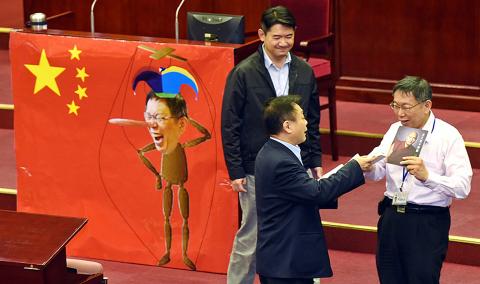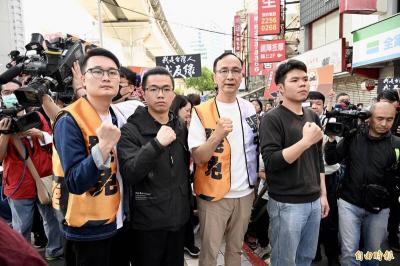Taiwan is an independent, sovereign state, but it also an abnormal nation, Taipei Mayor Ko Wen-je (柯文哲) said yesterday, adding that Taiwan is not part of China.
Ko made the remarks in response to a series of questions on cross-strait relations by Democratic Progressive Party (DPP) City Councilor Chen Tzu-hui (陳慈慧) at the Taipei City Council.
Ko’s interactions with Chinese officials in recent months and his controversial remarks, such as the “two sides of the Taiwan Strait are one family,” have sparked questions about his political stance and whether he has become pro-China.

Photo: Liu Hsin-de, Taipei Times
Asked whether Taiwan is “an independent, sovereign state,” Ko said: “Yes, but it not a normal country.”
Asked whether Taiwan is part of China, the mayor said: “It currently is not.”
Given four choices to describe Taiwan-China relations — state to state, two areas under one nation, Taiwan is part of China, or China is part of the Republic of China — Ko said he is the mayor of Taipei and did not need to answer the question.
When pressed by Chen to give a clearer answer, Ko ruled out the latter two options.
Asked whether he supports Taiwanese independence or unification with China, Ko said: “I will keep [the answer] to myself and will not tell anyone.”
Chen asked whether he views himself as Taiwanese or Chinese, and Ko said it would depend on the definition.
“I can accept being culturally Chinese, because we speak Mandarin Chinese, but Taiwan is, politically, not part of China,” he said, while adding that he prefers to be viewed as Taiwanese.
When Chen asked whether he still believes his remarks in July on Taiwan and China being “a community with a shared destiny,” Ko said that Taiwan and China have a close economic relationship, with about 40 percent of Taiwanese exports going to China, so it would be impossible to deny the influence and shared interests.
When asked if he might join a political party, Ko said he would not rule out the possibility.
However, being a “loner,” political parties might not want him even if he expressed an interest to join, Ko added.

The Ministry of Economic Affairs has fined Taobao NT$1.2 million (US$36,900) for advertisements that exceeded its approved business scope and ordered the Chinese e-commerce platform to make corrections in the first half of this year or its license would be revoked. Lawmakers have called for stricter supervision of Chinese e-commerce platforms and more stringent measures to prevent China from laundering its goods through Taiwan as US President Donald Trump’s administration cracks down on origin laundering. The legislature’s Finance Committee yesterday met to discuss policies to prevent China from dumping goods in Taiwan, inviting government agencies to report on the matter. Democratic Progressive Party

Taiwan and its Pacific ally Tuvalu on Tuesday signed two accords aimed at facilitating bilateral cooperation on labor affairs, according to Taiwan’s Ministry of Foreign Affairs (MOFA). The governments inked two agreements in Taipei, witnessed by Foreign Minister Lin Chia-lung (林佳龍) and visiting Deputy Tuvaluan Prime Minister Panapasi Nelesone, MOFA said in a news release. According to MOFA, the agreements will facilitate cooperation on labor issues and allow the two sides to mutually recognize seafarers’ certificates and related training. Taiwan would also continue to collaborate with Tuvalu across various fields to promote economic prosperity as well as the well-being of their

The Taipei District Prosecutors’ Office has continued its investigation into allegations of forged signatures in recall efforts today by searching the Chinese Nationalist Party’s (KMT) city chapter and questioning several personnel including the chapter director, according to media reports. Among those questioned and detained were KMT Taipei chapter director Huang Lu Chin-ju (黃呂錦茹), chapter secretary-general Chu Wen-ching (初文卿), chapter secretary Yao Fu-wen (姚富文) and first district committee executive director Tseng Fan-chuan (曾繁川). Prosecutors said they would not confirm reports about who had been summoned. The investigation centers on allegations that the ongoing recall campaigns targeting Democratic Progressive Party legislators Rosalia Wu (吳思瑤)

Several Chinese Nationalist Party (KMT) officials including Chairman Eric Chu (朱立倫) are to be summoned for questioning and then transferred to prosecutors for holding an illegal assembly in Taipei last night, the Taipei Police said today. Chu and two others hosted an illegal assembly and are to be requested to explain their actions, the Taipei City Police Department's Zhongzheng (中正) First Precinct said, referring to a protest held after Huang Lu Chin-ju (黃呂錦茹), KMT Taipei's chapter director, and several other KMT staffers were questioned for alleged signature forgery in recall petitions against Democratic Progressive Party (DPP) legislators. Taipei prosecutors had filed